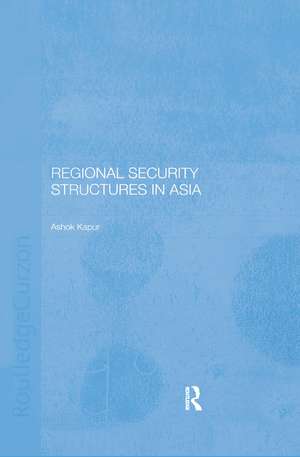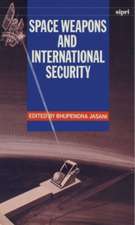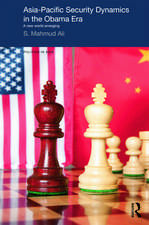Regional Security Structures in Asia
Autor Ashok Kaporen Limba Engleză Paperback – 30 iun 2020
| Toate formatele și edițiile | Preț | Express |
|---|---|---|
| Paperback (1) | 258.54 lei 6-8 săpt. | |
| Taylor & Francis – 30 iun 2020 | 258.54 lei 6-8 săpt. | |
| Hardback (1) | 669.11 lei 6-8 săpt. | |
| Taylor & Francis – 21 noi 2002 | 669.11 lei 6-8 săpt. |
Preț: 258.54 lei
Nou
Puncte Express: 388
Preț estimativ în valută:
49.49€ • 53.77$ • 41.60£
49.49€ • 53.77$ • 41.60£
Carte tipărită la comandă
Livrare economică 21 aprilie-05 mai
Preluare comenzi: 021 569.72.76
Specificații
ISBN-13: 9780367604691
ISBN-10: 0367604698
Pagini: 208
Dimensiuni: 156 x 234 x 11 mm
Greutate: 0.3 kg
Ediția:1
Editura: Taylor & Francis
Colecția Routledge
Locul publicării:Oxford, United Kingdom
ISBN-10: 0367604698
Pagini: 208
Dimensiuni: 156 x 234 x 11 mm
Greutate: 0.3 kg
Ediția:1
Editura: Taylor & Francis
Colecția Routledge
Locul publicării:Oxford, United Kingdom
Public țintă
Postgraduate and UndergraduateCuprins
1. Introduction 2. The Meaning and Importance of 'Asia' in International History and International Politics 3. Evolving International Structures in Asia-Pacific and The Indian Ocean Areas 4. Tied Together by Power Politics and Notional Realities: The Great Powers in Asia, the Nineteenth and Twentieth Century 5. The Situation in America and Asia and the Growth of Regionalism in Asia: An Overview 6. Multipopularity in Asian Regions 1940s-2000: An Overview 7. Multipopularity During the Cold-War 8. Regional Multipopularity After the End of the Cold War 9. The Future of Geo-Politics and the Nature of the Conflict in Asia 10. From Conflict Formation to Conflict Resolution: An Outline of the Process
Recenzii
'makes an important contribution to the literature on the study of Asian international relations.' - Contemporary Southeast Asia
Descriere
Ashok Kapor argues that explanations of international relations in Asia in the post-Second World War period have relied too much on the Cold War as a key explanatory factor, and outlines alternative concepts that may have wider explanatory powers.













